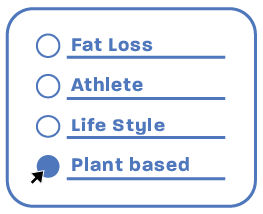MEET MATTER NUTRITION
Our philosophy goes beyond just food
Matter Nutrition is founded on curiosity for life. Our medium is food, but we are so much more than a meal plan — we are a movement in lifestyle wellness. We want to make food science-y again, and spread the message that nutrition isn’t just about what you eat, but more so about how you live. Our aim is to provide you with the tools you need to level up through evidence-based products, relatable information, sustainable systems, and actionable steps for your personal growth.

01
Choose your plan based on your goals (you can order online or whatsapp us)

02

03
Our team will confirm everything for you through message.

04

HOW IT WORKS
You can exclude up to 3 ingredients to ensure you avoid options containing these. Additionally, if you have any food dislikes these can be highlighted in your exclusions at time of ordering.
Meals are prepared within 12 hours of delivery to deliver optimal freshness to your doorstep.
We want you to enjoy the freshest food which is why we recommend you eat the food on day of delivery; however, the meals are safe to consume within 2 days of delivery.
We only use fresh ingredients, free from additives and preservatives.
Where possible the majority of our ingredients are locally sourced. Additionally, we only use grass-fed Angus beef, Farm Raised chicken and sustainably-sourced fish.*
We deliver up to 7 days per week (Sunday- Friday) from 3-6am or 8-11am anywhere within the Emirate of Dubai. We still deliver outside of Dubai but our delivery times may be slightly different depending on our partners.
Yes, simply request this via your online portal, all we ask is that you give us 48hours notice to process your request. Additionally, you can freeze deliveries for up to 1 month free of charge after giving us 48hours notice of your request on the portal.
If you have any issues, please contact your customer service representative or send us a message through the portal dashboard and we will endeavour to rectify this as soon as possible! For urgent issues, please contact us via 0505887815
After choosing your plan and payment you will receive a call from our Customer Service Rep to give you a final confirmation. Additionally. You will be provided with your login details.
